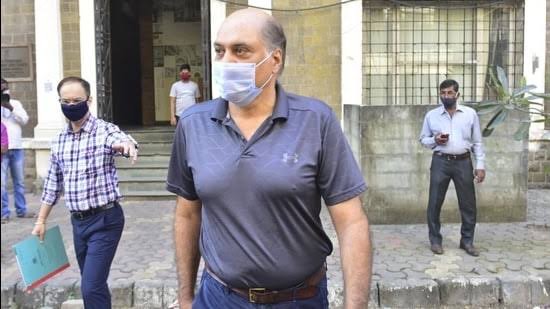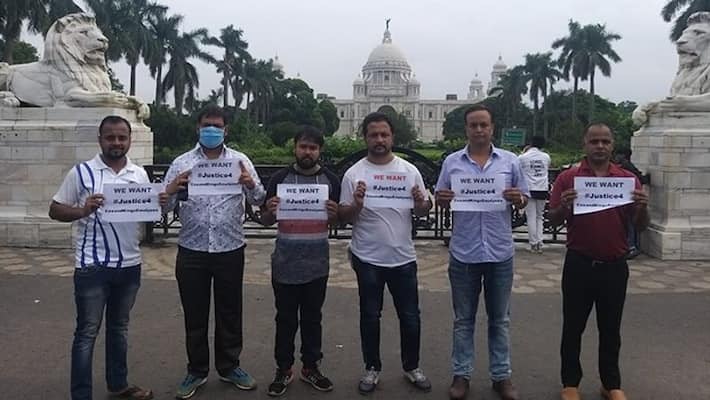Kerkar, the main promoter of Cox and Kings, is lodged at the Arthur Road Jail in Mumbai. He has tied himself in knots after investigators have drilled several holes in his defence.
Intricate details about the way cash was siphoned out from Cox and Kings are coming out like worms from the closet of company’s top promoter Peter Kerkar, currently lodged in Mumbai’s Arthur Road Jail.
As many as three charge sheets out of ten have been filed by investigators trying to get to the bottom of the case, the list includes the Economic Offences Wing of Mumbai Police, Enforcement Directorate, Central Bureau of Investigation and the Ministry of Finance.
At stake is a whopping Rs 8,000 crore and over 2500 jobless employees demanding an estimated Rs 100 crore as their dues. They have not been paid.
But details of how the cash was swindled has first surfaced from a 200-page report filed by the EOW, a copy of which is with this reporter.
The EOW report comes 15 months after cops on the railway tracks found the body of Sagar Deshpande, a chartered accountant employed by Cox & Kings as its finance manager. Deshpande had agreed to become a witness in the cases being probed by the investigators. And then, very mysteriously his body was found on the railway tracks in Thane, Mumbai, on October 12, 2020, days before he was to reportedly testify and provide documents to the ED. Mumbai Police continues to investigate circumstances behind his unnatural death. The EOW report highlights views of his colleagues who found him under tremendous pressure having done what was asked of him and now was fearful that he would be accused of the same.

Top sources say Kerkar is in deep trouble because of the EOW chargesheet which has been submitted to a court in Mumbai, terming the FIRs filed by him against his employees, the company’s top brass and his bankers as false. The report has concluded that Kerkar had filed the FIRs to “safeguard himself from the onus of criminality arising out of 10 cases registered against him.”
The EOW report highlights the following:
- Stanford-educated Kerkar tried filing FIRs with cops near his office. He failed and then faked an address at a chawl in Sewri near Lower Parel. And when the investigators went to Sewri, his lies collapsed like a pack of cards.
- The Desai Saksena and Associate forensic report, the foundation of Kerkar’s claims, was — shockingly — disowned by the accounting firm itself.
- The firms told the EOW they never had access to the books of account, but were pressured to selectively focus on a Rs 83 crore transaction between Ezeego and Redkite (owned by the CFO of Cox and Kings and its internal auditor). And all this while being stonewalled over their query regarding receivables of Rs 1000 crore from fraudulent parties.
- As many as 15 fraudulent customers were at the core of bogus revenues being booked to inflate the financial performance of both Cox and Kings and Ezeego. The accounts were masked away from the SAP/Oracle accounting system. The idea, claimed EOW, was to help in the proposed IPO in 2009 of Cox & Kings. So, the scheme to inflate financials and give false sense of security to stakeholders and employees was in place for over a decade.
Kerkar, claimed the EOW, blamed almost anyone and everyone who worked with him, the list was a huge one and ranged from lending banks and their employees to the Ares SSG fund, from who he had raised money, and its partner and even some of his own employees. The idea, claimed EOW, was to siphon cash and hide the true state of affairs from the promoters. He even pushed the audit firm Desai, Saksena and Associates to write a forensic analysis of the financial health of Cox and Kings Limited, a listed entity, and Ezeego, a privately held promoter company.
The EOW says the plans were executed cleverly by Peter Kerkar, his sister Urshilla Kerkar and other members of his coterie. The EOW says Peter Kerkar himself negotiated with various banks for loans and presented false and inflated data about the company’s financial status. Kerkar also issued personal guarantees and then claimed his signatures were faked but eventually fell silent when forensic reports claimed that he had actually signed all the papers.

EOW says an estimated Rs 900 crore was siphoned from Ezeego and diverted into promoters’ companies to either pay off their liabilities and finance loans Kerkar took against his shares in Cox and Kings.
The EOW report is the second nail in the coffin of Kerkar.
Earlier, the UK High Court has dismissed Kerkar’s pleas against SSG Capital and one of its founders, Shyam Maheshwari. The court said Kerkar’s personal bankruptcy proceedings can continue in the UK. The court also said there is no or insufficient evidence to support the allegations made by Kerkar to satisfy the court that there is a real prospect of success.
What is interesting is that the UK Court studied papers offered by Kerkar for over 18 months to come to this conclusion. The ruling by Judge Burton evaluated all evidence tendered and allegations made by Kerkar before dismissing the same.
The court ruled that Kerkar allegations of fraud against creditors and their employees are based on his unsubstantiated belief that Maheshwari, as the controller of SSG entities, is responsible for PHUK’s inability to repay monies it borrowed from SSG with Kerkar as guarantor. The court also said that no further investigation is warranted as there is no reasonable chance of any success.
Ares SSG Capital had lent Rs 500cr (in foreign currency) to PHUK, the holding company of Meininger Hotel. Aside from security of the Meininger Hotel, it had corporate guarantees of Cox and Kings Limited and Mr. Peter Kerkar. On payment default of the loan, Ares SSG invoked personal guarantee of Mr. Peter Kerkar, which he defended vigorously in the UK courts – but ultimately failed to prove any of his allegations.
The UK Judge also highlighted this fact that Kerkar planned a unique defence strategy to prevent the charging of the promoters with banking frauds by blaming the creditors.
The UK Judgment further said the following: “It is inherently implausible that a man of Mr. Kerkar’s extensive business interests would have been prepared to rely on a statement without accepting his allegations that the guarantees were merely procedural and not to be invoked.”
What is interesting is the defence strategy and allegations made by Kerkar in the UK were similar to those being adopted by him in the Indian proceedings. Kerkar — very strategically — had filed complaints against all banks, employees of these banks, funds including SSG Capital and its Partners and all others whose loans he had defaulted on, blaming them for the downfall of the CKL group.
Incidentally, all the banks, and SSG Capital had filed prior complaints against Kerkar and his sister Urshila, CKL and other relevant employees before the EOW, Mumbai. And what is interesting is that just like the UK Court, the Indian court also saw through Kerkar’s lies before rejecting the bail application in the money laundering case. This is what the PMLA Court in Mumbai said: “When illegal things were uncontrolled and gone beyond capacity of Mr. Ajit Ajay Peter Kerkar as he was taking the account in quarter end of each financial section, he woke up and lodged the report with intent not only to save himself but also to save from the actions to be initiated by the other promoters/directors/shareholders of CKL group of companies. Hence, all this resulted in registration of FIR and led to registration of ECIR, which was dug out by ED in the investigation to show the offence of money laundering”.
This is not all.
The Court actually noted that Kerkar was the main perpetrator of cheating and fraud, and misused his position as CEO, possibly in collusion with Anil Khandelwal and Naresh Jain, in siphoning of funds from CKL.
Highly placed sources told this reporter that Kerkar knew that SSG Capital would be able to pin him down abroad — where his illegal assets were parked — and as a result, Kerkar levelled serious allegations against SSG in India, replicating the same in the UK Court.
Kerkar said SSG Capital engineered the default in the UK in order to take over the Meininger Hotel business. Kerkar did not mention that he was on the board of the hotel business.
Now, the sale process was run by Lazards, a firm of high repute. The process stopped because of the Covid outbreak in early 2020. What worked for SSG Capital and its co-investors was that they provided much needed capital for the COVID hit business to survive. This was quite different from Kerkar letting his employees in India fend for themselves without any recourse.
Kerkar’s allegation that SSG Capital co-founder Maheshwari controlled Redkite, which allegedly benefitted from monies from Cox and Kings indirectly via Ezeego, fell flat. The judge held that Maheshwari was neither a director nor shareholder in Redkite.
The judge further said there was simply no evidence before the Court that Maheshwari would exercise control over Redkite. The judgement rightly noted that “Mr. Kerkar has failed to provide any evidence beyond his own complaint to the police to show: i) how Ares SSG Group was involved in Redkite ; ii) how Mr Maheshwari allegedly controlled Redkite; and iii) that monies siphoned away from CKL (of which Mr Kerkar was CEO), to Ezeego (a company controlled and owned by Mr Kerkar and his sister) which were then allegedly transferred to Redkite were ultimately used to fund the acquisition of TFCI.”
The fact that Kerkar has failed in proceedings in Mauritius and the UK in addition to the ongoing Indian proceedings, clearly indicates no judiciary is convinced by his claims.
Flashy Kerkar, who once was a frequent flier between Mumbai and London and sweet talked (read conned) people into deals which eventually failed, is now in a cell in a Mumbai jail. The fact that this long-standing fraudulent scheme continued at Cox and Kings is surprising but not beyond imagination – as similar ponzi schemes have been perpetrated numerous times by people who are seen as nice, dependable, caring, persuasive but ultimately fraudsters.
Set up in 1758, Cox and Kings was the oldest of its kind in the world. It was set up around the time the British rulers established control over large tracts of India after a resounding victory in the Battle of Plassey in Bengal. Cox and Kings is in total doldrums, its employees remain unpaid.

